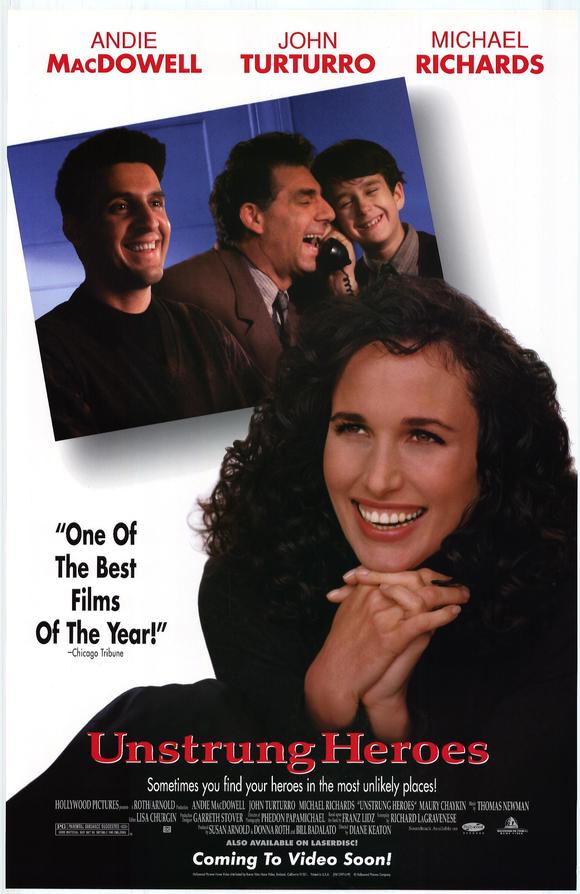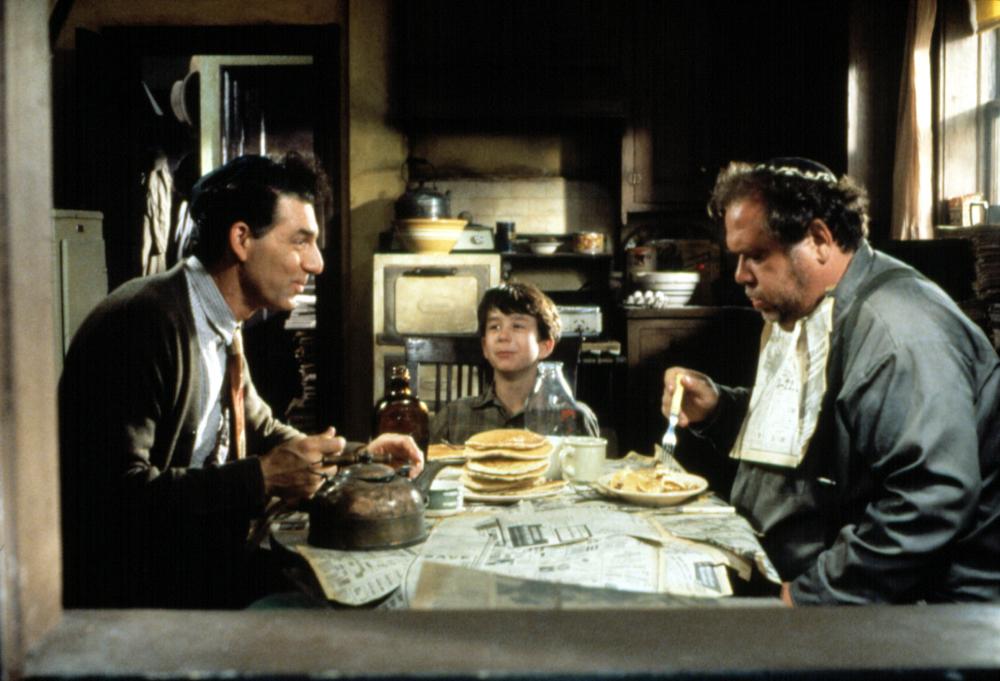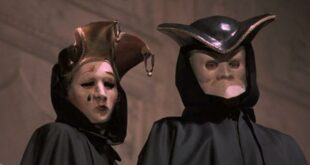Aryan Skynet
November 9, 2014

Michael Richards, while appearing as Cosmo Kramer on NBC’s “Must See TV” series Seinfeld (1989-1998), also had opportunities to play variations on Jerry’s hyper-eccentric neighbor in movies such as Problem Child (1990) and Trial and Error (1997). Of his 1990s side projects, the most noteworthy is probably Unstrung Heroes (1995), a quality family drama scripted by The Fisher King (1991) screenwriter Richard LaGravenese and directed by Diane Keaton, a woman with intimate knowledge of Jewish neurosis owing to her relationship with Woody Allen (real name Allan Konigsberg).
Set in the seemingly boundless promise of early 1960s America, Unstrung Heroes is the story of Steven Lidz (Nathan Watt), a Jewish boy whose idyllic life goes awry when his mother (Andie MacDowell) becomes terminally ill with cancer. Life with his loving but difficult father (John Turturro) becomes too much for Steven to handle as they idly wait for his mother to die, so he finds an escape by going to live with his two bizarre uncles, Arthur (Maury Chaykin) and Danny (Richards), in their cluttered rat’s nest of an apartment. Each a lovable man-child in his individual way, the pair together constitutes a sort of dual Falstaff/Trotsky figure to Steven’s adolescent Henry – irresponsible codgers who will divert him and make him forget his troubles, while also initiating him into his future concerns with politics, spirituality, and ethnonational identity. “You have my permission not to listen to anything they say,” Steven’s more down-to-earth mother admonishes him beforehand.
Whereas Steven’s father is a secular Jew and scientific genius who believes that “pure science will be earth’s ultimate salvation” and that Heaven only exists “in the minds of morons”, Danny and Arthur are of a decidedly more religious and irrational bent. Though the “Holocaust” is at no point explicitly referenced in Unstrung Heroes, one senses its constant presence hovering cloud-like over Danny and Arthur, whose obsessive hoarding of junk, one suspects, is informed by a haunting sense of loss and resultant desire to rescue a little something of everything. “Dreams, they’re like memories,” Arthur explains to Steven as he shares with him a book of collages he keeps as a record of things he has dreamed. This creative relationship between dreams and memories to which Arthur refers suggests, too, the blurring of historiography and fantastical construction in the Jewish group consciousness, particularly with regard to events of the Second World War.

An ardent Marxist and a Zionist zealot who wears his yarmulke to the dinner table, Danny is more paranoid than Arthur and suffers from what can only be called a severe persecution complex. His insane accusations of “Fascist!” make the funniest moments in Unstrung Heroes. Danny contends that Eisenhower himself was a crypto-Nazi and that the slogan “I Like Ike” is merely code for “I Hate Kikes” and holds the fascist United States culpable also for “crucifying the Rosenbergs”. “Idaho”, furthermore, means “Jew hater” in Cherokee, so that anti-Semitism would seem to be something primordial and perhaps inherent to the American continent, predating even European immigration. Danny goes so far as to be fearful that he may be under surveillance at innocent family gatherings.
Danny encourages student president candidate Steven in his budding political aspirations, watching him go from a timid nebbish humiliated by little “Hitler in the making” Ralph Crispi (Sean Donahue) to a radical firebrand who disrupts his class by singing the “Internationale”. Steven even changes his name to “Franz” to sound more foreign and Jewish and plunges headlong into Danny’s imaginings of a monolithic gentile conspiracy. When antagonistic landlord Mr. Lindquist (Jack McGee) threatens packrats Danny and Arthur with eviction, Danny determines that “Action must be taken – an offensive plan!” After outsmarting a building inspector, they proceed to smear Lindquist and vindictively call his sanity into question, recommending that he be placed under “mandatory psychiatric care”.
Ultimately, however, it is Danny who comes to understand that he is the one who has gone insane, and following a frightening crack-up he finally checks himself into a mental institution. While most Hollywood movies prefer to portray Jews as heroes, victims, or harmless, lovable kvetchers, Unstrung Heroes has the comparative honesty to expose the cockeyed Zionist ADL mentality for the threadbare, petty, and self-destructively crazy rag-pickery that it is. “People, they get trapped in their own history unless someone shows them a way out,” confides Danny, a man who finally realizes that he has been victimized not by the totalitarian goyim, but by his own ethnic paranoia. The “way out” for Danny, significantly, is his local sanatorium.
 Daily Stormer The Most Censored Publication in History
Daily Stormer The Most Censored Publication in History


